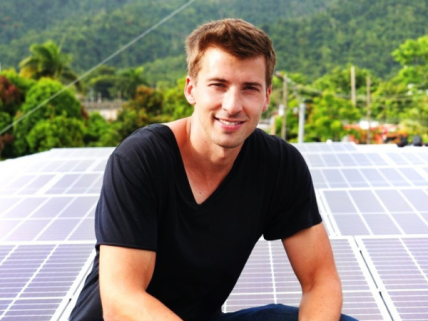Alumni Spotlight: Hunter Johansson (MPA 2018)

Solar Responders (SR), a New York-based nonprofit organization, installs solar power and battery storage in fire stations in Puerto Rico. The organization’s mission was developed in response to the devastation Hurricane Maria caused to the island’s power grid and emergency response infrastructure. Over the past four years, SR has successfully spearheaded efforts to install solar power and storage on 19 of the island’s fire stations with the ultimate goal of commissioning and operating solar systems on all 96 fire stations. Hunter Johansson (MPA 2018), the founder and CEO, began the work that eventually became SR while he was still an NYU Wagner student.
Johansson’s journey to founding SR was a long one. Prior to pursuing his degree at NYU Wagner, Johansson worked in a variety of spaces, starting in the political and labor spheres as a community organizer. Johansson reflects that for him, it was person-to-person contact as a means of building community power that spoke to his heart. After leaving politics, it was this idea that stuck with him, and in 2012 he had the opportunity to continue following this passion. After Hurricane Sandy hit New York City, he held a leadership role in a local nonprofit founded by one of his friends that helped vulnerable homeowners most affected by the hurricane. What began as food and clothing drives became an impactful nonprofit organization that rebuilt more than 150 homes in Southeast Queens and Brooklyn, specifically helping individuals who were ineligible for government-funded recovery and rebuilding programs.
After several years of helping to build this organization, Johansson made the decision to attend NYU Wagner to study nonprofit management as a means of gaining more technical, organizational, and leadership skills. When Hurricane Maria hit Puerto Rico, causing the longest blackout in US history, Johansson felt compelled to visit the island to assist in the recovery efforts. He learned that the loss of power made the communications equipment at fire stations inoperable, greatly impacting the health and safety of the island’s residents. First responders were unable to respond to life-threatening emergencies in their communities, resulting in increased deaths in the days, weeks, and months after the storm. Fire stations were forced to use diesel generators, which eventually broke down due to overuse and lack of maintenance, leaving a life-saving community resource stranded and unable to save lives during this most critical time.
Through his conversations with the fire department and local renewable energy advocates, Johansson immediately got to work. He had the opportunity to create the vision and business plan of what would become SR through a social impact class at NYU Wagner taught by Raj Thakkar. Simultaneously, he began fundraising, all while flying between Puerto Rico and New York to begin building the partnerships integral to SR’s work on the ground. Eleven months after Hurricane Maria, SR was incorporated as a nonprofit organization, and the solar installations began.
The impact of SR’s 19 solar and storage installations has been significant—during extended power outages (especially common during Puerto Rico’s hurricane season), these systems have provided over 1,200 hours of back-up power to the fire stations. Additionally, the systems are saving the fire department an estimated 30-90% on its energy bills each month and removing 80-120 metric tons of carbon dioxide from the environment every year.
In 2019, Puerto Rico passed Act 17, a law mandating that by 2050 one hundred percent of the island’s electricity will be generated with renewable energy. While there is still much work to be done, SR takes pride in its engagement with the island’s government agencies and local communities to help reach this goal. Deep stakeholder relationship building and engagement with government and community-based organizations is the impetus for empowering sustainable solutions and scaling SR’s work. Johansson emphasizes the importance of fostering collaboration in order to create new pathways and models. SR has one such partnership with a nonprofit that registers and trains Puerto Rican women to be apprentice electricians, conducting maintenance of solar and storage energy systems.
When asked what advice he might give to NYU Wagner students, Johansson emphasizes the following: “Ultimately, this organization is not my organization—it’s Puerto Rico’s organization. These are their power and energy sources, their fire stations. This is their island, I'm just helping to sew the thread. My recommendation for Wagner students would be to always keep your hands and feet to the ground. Always stay connected to the earth, literally and figuratively. By doing that, the answers are there.”